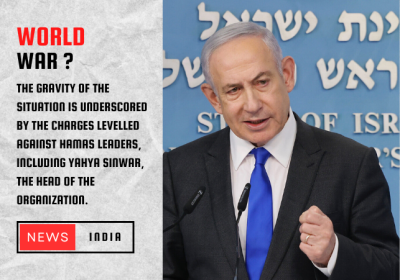Israel-Iran War
Iran-Israel Tension: Ira n claimed - Warned 72 hours ago, America denied, knowing every big thing related to the controversy.
- By --
- Monday, 15 Apr, 2024
Iran's Ambassador to the United Nations, Amir Saied Iravani, defended the attack, saying that Iran carried out this attack while respecting the right to self-defense.
Iran Attacked On Israel: These days, fire is raging in the Middle East. Late on Saturday (April 13), Iran attacked Israel. Iran took this action in response to Israeli attacks on its embassy compound in Syria. Iranian Foreign Minister Hossein Amirabdollahian claimed that Iran had warned neighboring countries and Israel's ally, the United States, 72 hours before the attack.
However, a senior official of the Biden administration denied these claims, stating that Washington did not receive any such warning. Meanwhile, Turkish, Jordanian, and Iraqi officials have said that Iran had already informed Israel of the attack, along with both neighboring countries and the United States.
Key Points Related to the Case -
- A senior official of the Biden administration, speaking to the news agency Reuters, denied these claims and said that Tehran did not warn Washington. The official alleged that Iran contacted the United States only after the attack began.
- According to ABC News, the Israeli Defense Forces (IDF) have proposed several military response options to Benjamin Netanyahu's government in response to the Iranian attack. These options include everything from striking to avoiding immediate action. Israeli officials told Reuters that the war cabinet is in favor of retaliatory action against Iran, but there are disagreements over the timing and scale of such a response.
- Israeli military spokesman Rear Admiral Daniel Hageri said that Israel is on high alert after the attack. Operational plans for aggressive and defensive actions have been approved.
- The Israeli Defense Forces (IDF) said on Monday that all restrictions imposed as a precaution before the Iranian attack on Saturday night have been lifted.
- According to a message by the Xinhua news agency, Israel imposed a ban on all educational activities and significant outdoor events on Saturday before the missile and drone attacks by Iran.
- The IDF said in a statement that after assessing the situation, it was decided to lift these restrictions from Sunday midnight. All educational activities in Israel have now resumed, and bans on assemblies have also been lifted.
- Leaders of the European Union (EU) and the Group of Seven (G7) have called for restraint to prevent the situation from escalating further in the Middle East in the wake of Iran's retaliatory strikes on Israel.
- European Council President Charles Michel said on Sunday on social media that everything should be done to prevent tension from increasing in the region. The bloodshed must be avoided. We are closely monitoring the situation with our partners.
- Leaders of the G7 countries held a virtual meeting on Sunday and expressed complete solidarity and support for Israel and its people and reaffirmed their commitment to its security. In a statement issued by the White House, they condemned Iran's direct and unprecedented attacks in harsh terms. Iran fired hundreds of drones and missiles at Israel. But with the help of its allies, Israel defeated Iran.
- In the meantime, Iran's actions have been strongly condemned and strongly criticized by the United Nations. In a meeting of the United Nations Security Council on Sunday, American Ambassador Robert A. Wood warned Tehran that if it targeted Israel or America further, it would face consequences. Britain's representative, Barbara Woodward, echoed the American envoy's sentiments, condemning the Iranian attacks and stating that they also pose a danger to Jordan and Iraq.

.png)

.png)
.png)
.png)
